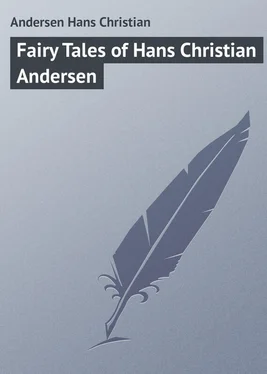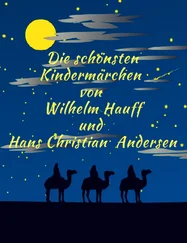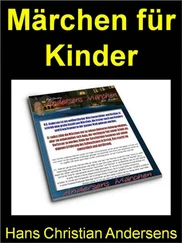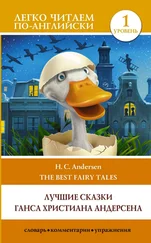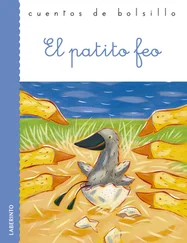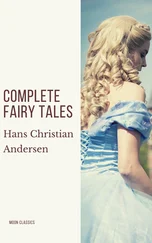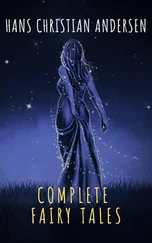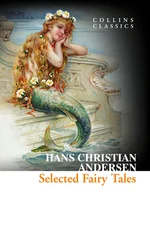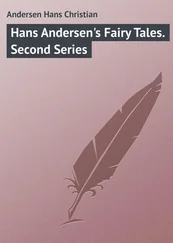Andersen Hans - Fairy Tales of Hans Christian Andersen
Здесь есть возможность читать онлайн «Andersen Hans - Fairy Tales of Hans Christian Andersen» — ознакомительный отрывок электронной книги совершенно бесплатно, а после прочтения отрывка купить полную версию. В некоторых случаях можно слушать аудио, скачать через торрент в формате fb2 и присутствует краткое содержание. Жанр: foreign_language, foreign_prose, на английском языке. Описание произведения, (предисловие) а так же отзывы посетителей доступны на портале библиотеки ЛибКат.
- Название:Fairy Tales of Hans Christian Andersen
- Автор:
- Жанр:
- Год:неизвестен
- ISBN:нет данных
- Рейтинг книги:5 / 5. Голосов: 1
-
Избранное:Добавить в избранное
- Отзывы:
-
Ваша оценка:
- 100
- 1
- 2
- 3
- 4
- 5
Fairy Tales of Hans Christian Andersen: краткое содержание, описание и аннотация
Предлагаем к чтению аннотацию, описание, краткое содержание или предисловие (зависит от того, что написал сам автор книги «Fairy Tales of Hans Christian Andersen»). Если вы не нашли необходимую информацию о книге — напишите в комментариях, мы постараемся отыскать её.
Fairy Tales of Hans Christian Andersen — читать онлайн ознакомительный отрывок
Ниже представлен текст книги, разбитый по страницам. Система сохранения места последней прочитанной страницы, позволяет с удобством читать онлайн бесплатно книгу «Fairy Tales of Hans Christian Andersen», без необходимости каждый раз заново искать на чём Вы остановились. Поставьте закладку, и сможете в любой момент перейти на страницу, на которой закончили чтение.
Интервал:
Закладка:
'Snip, snap, snurre,
Basse lurre.'
But the song is not ended yet, I am sure; it is only just beginning. How wonderful it is, that after all I have suffered, I am made something of at last; I am the luckiest person in the world – so strong and fine; and how white, and what a length! This is something different to being a mere plant and bearing flowers. Then I had no attention, nor any water unless it rained; now, I am watched and taken care of. Every morning the maid turns me over, and I have a shower-bath from the watering-pot every evening. Yes, and the clergyman's wife noticed me, and said I was the best piece of linen in the whole parish. I cannot be happier than I am now."
After some time, the linen was taken into the house, placed under the scissors, and cut and torn into pieces, and then pricked with needles. This certainly was not pleasant; but at last it was made into twelve garments of that kind which people do not like to name, and yet everybody should wear one. "See, now, then," said the flax; "I have become something of importance. This was my destiny; it is quite a blessing. Now I shall be of some use in the world, as everyone ought to be; it is the only way to be happy. I am now divided into twelve pieces, and yet we are all one and the same in the whole dozen. It is most extraordinary good fortune."
Years passed away, and at last the linen was so worn it could scarcely hold together. "It must end very soon," said the pieces to each other; "we would gladly have held together a little longer, but it is useless to expect impossibilities." And at length they fell into rags and tatters, and thought it was all over with them, for they were torn to shreds, and steeped in water, and made into a pulp, and dried, and they knew not what besides, till all at once they found themselves beautiful white paper. "Well, now, this is a surprise; a glorious surprise too," said the paper. "I am now finer than ever, and I shall be written upon, and who can tell what fine things I may have written upon me. This is wonderful luck!" And sure enough the most beautiful stories and poetry were written upon it, and only once was there a blot, which was very fortunate. Then people heard the stories and poetry read, and it made them wiser and better; for all that was written had a good and sensible meaning, and a great blessing was contained in the words on this paper.
"I never imagined anything like this," said the paper, "when I was only a little blue flower, growing in the fields. How could I fancy that I should ever be the means of bringing knowledge and joy to man? I cannot understand it myself, and yet it is really so. Heaven knows that I have done nothing myself, but what I was obliged to do with my weak powers for my own preservation; and yet I have been promoted from one joy and honor to another. Each time I think that the song is ended; and then something higher and better begins for me. I suppose now I shall be sent on my travels about the world, so that people may read me. It cannot be otherwise; indeed, it is more than probable; for I have more splendid thoughts written upon me, than I had pretty flowers in olden times. I am happier than ever."
But the paper did not go on its travels; it was sent to the printer, and all the words written upon it were set up in type, to make a book, or rather, many hundreds of books; for so many more persons could derive pleasure and profit from a printed book, than from the written paper; and if the paper had been sent around the world, it would have been worn out before it had got half through its journey.
"This is certainly the wisest plan," said the written paper; "I really did not think of that. I shall remain at home, and be held in honor, like some old grandfather, as I really am to all these new books. They will do some good. I could not have wandered about as they do. Yet he who wrote all this has looked at me, as every word flowed from his pen upon my surface. I am the most honored of all."
Then the paper was tied in a bundle with other papers, and thrown into a tub that stood in the washhouse.
"After work, it is well to rest," said the paper, "and a very good opportunity to collect one's thoughts. Now I am able, for the first time, to think of my real condition; and to know one's self is true progress. What will be done with me now, I wonder? No doubt I shall still go forward. I have always progressed hitherto, as I know quite well."
Now it happened one day that all the paper in the tub was taken out, and laid on the hearth to be burnt. People said it could not be sold at the shop, to wrap up butter and sugar, because it had been written upon. The children in the house stood round the stove; for they wanted to see the paper burn, because it flamed up so prettily, and afterwards, among the ashes, so many red sparks could be seen running one after the other, here and there, as quick as the wind. They called it seeing the children come out of school, and the last spark was the schoolmaster. They often thought the last spark had come; and one would cry, "There goes the schoolmaster;" but the next moment another spark would appear, shining so beautifully. How they would like to know where the sparks all went to! Perhaps we shall find out some day, but we don't know now.
The whole bundle of paper had been placed on the fire, and was soon alight. "Ugh," cried the paper, as it burst into a bright flame; "ugh." It was certainly not very pleasant to be burning; but when the whole was wrapped in flames, the flames mounted up into the air, higher than the flax had ever been able to raise its little blue flower, and they glistened as the white linen never could have glistened. All the written letters became quite red in a moment, and all the words and thoughts turned to fire.
"Now I am mounting straight up to the sun," said a voice in the flames; and it was as if a thousand voices echoed the words; and the flames darted up through the chimney, and went out at the top. Then a number of tiny beings, as many in number as the flowers on the flax had been, and invisible to mortal eyes, floated above them. They were even lighter and more delicate than the flowers from which they were born; and as the flames were extinguished, and nothing remained of the paper but black ashes, these little beings danced upon it; and whenever they touched it, bright red sparks appeared.
"The children are all out of school, and the schoolmaster was the last of all," said the children. It was good fun, and they sang over the dead ashes, —
"Snip, snap, snurre,
Basse lure:
The song is ended."
But the little invisible beings said, "The song is never ended; the most beautiful is yet to come."
But the children could neither hear nor understand this, nor should they; for children must not know everything.
THE FLYING TRUNK
There was once a merchant who was so rich that he could have paved the whole street with gold, and would even then have had enough for a small alley. But he did not do so; he knew the value of money better than to use it in this way. So clever was he, that every shilling he put out brought him a crown; and so he continued till he died. His son inherited his wealth, and he lived a merry life with it; he went to a masquerade every night, made kites out of five pound notes, and threw pieces of gold into the sea instead of stones, making ducks and drakes of them. In this manner he soon lost all his money. At last he had nothing left but a pair of slippers, an old dressing-gown, and four shillings. And now all his friends deserted him, they could not walk with him in the streets; but one of them, who was very good-natured, sent him an old trunk with this message, "Pack up!" "Yes," he said, "it is all very well to say 'pack up,'" but he had nothing left to pack up, therefore he seated himself in the trunk. It was a very wonderful trunk; no sooner did any one press on the lock than the trunk could fly. He shut the lid and pressed the lock, when away flew the trunk up the chimney with the merchant's son in it, right up into the clouds. Whenever the bottom of the trunk cracked, he was in a great fright, for if the trunk fell to pieces he would have made a tremendous somerset over the trees. However, he got safely in his trunk to the land of Turkey. He hid the trunk in the wood under some dry leaves, and then went into the town: he could so this very well, for the Turks always go about dressed in dressing-gowns and slippers, as he was himself. He happened to meet a nurse with a little child. "I say, you Turkish nurse," cried he, "what castle is that near the town, with the windows placed so high?"
Читать дальшеИнтервал:
Закладка:
Похожие книги на «Fairy Tales of Hans Christian Andersen»
Представляем Вашему вниманию похожие книги на «Fairy Tales of Hans Christian Andersen» списком для выбора. Мы отобрали схожую по названию и смыслу литературу в надежде предоставить читателям больше вариантов отыскать новые, интересные, ещё непрочитанные произведения.
Обсуждение, отзывы о книге «Fairy Tales of Hans Christian Andersen» и просто собственные мнения читателей. Оставьте ваши комментарии, напишите, что Вы думаете о произведении, его смысле или главных героях. Укажите что конкретно понравилось, а что нет, и почему Вы так считаете.
